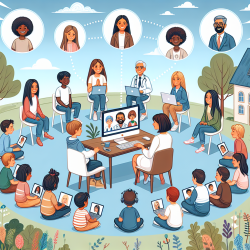The field of pediatric psychology is uniquely positioned to address the complex interplay between health and social factors affecting children. One pressing issue is the impact of systemic racism and adverse experiences with law enforcement officers (LEOs) on children's mental health. The research article "Anti-Racism Strategies in Pediatric Psychology: Using STYLE Can Help Children Overcome Adverse Experiences With Police" offers a comprehensive framework known as STYLE to guide practitioners in this critical work.
The Need for Anti-Racism Strategies in Pediatric Psychology
The United States has witnessed numerous cases of police violence against Black and Indigenous people of color (BIPOC), leading to widespread protests and heightened awareness of systemic racism. Pediatric psychologists often encounter families expressing distrust towards police during therapy sessions. This context underscores the need for culturally responsive care that addresses the unique challenges faced by BIPOC communities.
The Biopsychosocial Model
Pediatric psychologists frequently use the biopsychosocial model to understand how biological, psychological, and social factors interact to affect child health. Adverse childhood experiences (ACEs), including systemic violence, significantly impact children's well-being. However, many ACEs related to community-police interactions remain underexplored in pediatric psychology.
Introducing the STYLE Framework
The STYLE framework offers a structured approach for pediatric psychologists to engage in anti-racist practices:
- S: Self-examination and critical reflection on personal biases and privileges.
- T: Talk about community-police relations and structural racism openly.
- Y: Yield space and time for anti-racism work within professional settings.
- L: Learn about structural racism's impact on child health.
- E: Evaluate policies and practices through an anti-racism lens.
Implementing STYLE in Clinical Practice
Pediatric psychologists can incorporate STYLE principles into their clinical work by engaging in self-examination to increase awareness of biases. This involves continuous education on trauma-informed care and systemic racism's role as a fundamental cause of disease. Practitioners should also talk openly about racism with patients and families, using systems-centered language that humanizes individuals experiencing oppression.
Self-Examination and Awareness
Pediatric psychologists are encouraged to explore their identities using frameworks like ADDRESSING to understand their privileges and oppressions. This self-awareness is crucial for effectively working with BIPOC children and their families.
Talking About Racism
Pediatric psychologists should use accurate language when discussing racism, incorporating systems-centered language into clinical reports and communications. Understanding racial inequity is vital for providing informed care.
The Role of Education and Advocacy
Pediatric psychologists must yield time for anti-racism work by providing clinical care that acknowledges LEO exposure's impact on BIPOC youth. Direct work with LEOs through training programs can improve their understanding of child development and reduce systemic violence during community-police interactions.
Lifelong Learning
Pediatric psychologists should seek continued education on structural racism's impact on patients. Resources like books, online talks, and workshops can provide valuable insights without placing additional burdens on BIPOC colleagues or patients.
A Commitment to Equity
Pediatric psychologists should visibly demonstrate their commitment to social justice values through office decor, discussions with patients, and advocacy efforts aimed at changing systemic practices that drive health inequities.
The Path Forward: Evaluating Policies and Practices
The evaluation component of the STYLE framework is essential across academic and advocacy settings. By promoting anti-racism through policy changes, pediatric psychologists can ensure equitable practices that do not disproportionately burden BIPOC faculty or students.
A Call to Action
Pediatric psychologists are encouraged to adopt the STYLE framework to enhance their practice and advocate for system-based change. By doing so, they can improve the well-being of children from BIPOC communities affected by systemic racism and adverse police interactions.










